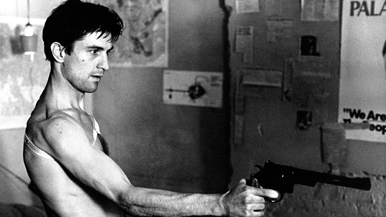Viking Night: Taxi Driver
By Bruce Hall
May 17, 2011
Have you ever fantasized about a wave of violence and death sweeping away society, leaving nothing but you and your apocalyptic daydreams? It’s okay if you haven’t, because Travis Bickle has. There’s no doubt from the very beginning of Taxi Driver that this former Marine and hard luck drifter is anything other than a very disturbed man. The first time we see him, it’s fairly obvious that the man is in need of professional help. He seems just a little too tightly coiled as he turns in his application at a New York cab service, where he’s intentionally looking for a cruel job with long hours and an isolated working environment. He shuffles and fidgets and makes uncomfortable jokes, including one about his own sanity. You get the impression the guy only wants to work because he’s afraid to let his mind grow idle, as if doing so might allow it to conjure up deadly things. And we see right from the beginning of the film that it does.
Like the Protagonist in Fight Club, Travis Bickle (Robert DeNiro) has mentally unraveled into fits of sleeplessness and depression, and this is what sets the story in motion. Since he can’t find slumber he drives his cab almost constantly, which means a fat payday for this enterprising delusional insomniac. But the on the job conditions are borderline medieval, and the hours take their toll quickly. When he’s not hauling johns through filthy neighborhoods to pick up hookers or cleaning bloodstains off the back seat of his cab, Bickle can be found hanging around porno theaters trying to look invisible. His diet consists of potatoes and milk, washed down with Alka-Seltzer. Sometimes he scribbles random, violent thoughts into a tattered journal or lies in bed staring at stains on the ceiling. It’s not a very healthy life, but Travis Bickle is not a healthy man. And he exists in a state of mental isolation so profound that when the inevitable need for structure in life finally hits him, it overwhelms him.
So, he responds the way any self respecting paranoid schizophrenic would - by developing fixations. First there was that punishing job schedule, designed to keep Bickle’s agitated mind occupied. For a while it works, and then he begins to obsess over an idealistic campaign worker named Betsy (Cybill Shepherd) who’s in the middle of trying to get her boss elected president. At first Betsy is intrigued by Travis’ odd habits and quirky verbal tics, but their relationship quickly becomes yet another trigger for Bickle’s slowly evolving state of lost marbles. Later, Travis takes up the case of an underage streetwalker named Iris (Jodie Foster), who works the intersections under the watchful eye of a sadistic pimp named Sport (Harvey Keitel). Iris doesn’t like what she does but has little choice in the matter, as Sport keeps her plied with drugs and the threat of violence.
At the beginning of the film, Bickle blames society for his feelings of isolation and had already started thinking of ways to lash out against the world. But in Iris, for the first time he is able to see someone else as a victim and he begins to consider directing his resources toward something worthwhile. There’s no question Bickle is a ticking time bomb, and that he’s eventually going to go off. The mystery is which way he’ll direct the blast.
Continued:
1
2
|
|
|
|




